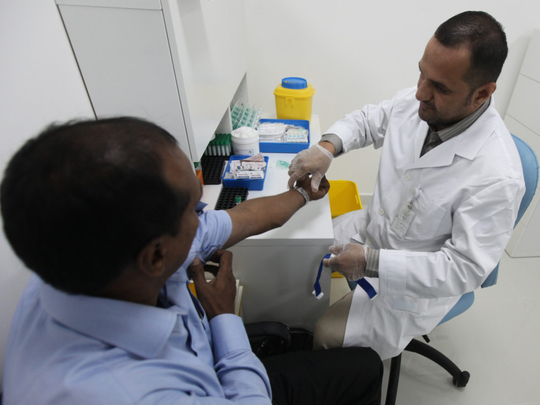
Abu Dhabi: Patients, their cohabitants and persons suspected to be infected with certain infectious diseases, including anthrax, cholera, avian influenza and HIV/Aids, will receive free treatment at government hospitals across the country, according to new rules published on Monday.
The executive rules of the Infectious Diseases Law, which will take effect in six months, cover citizens and foreigners on visit or residence visa.
Food poisoning, diphtheria, acute flaccid paralysis, botulism, enterochaemorrhagic escherichia coli (E Coli), haemophius influenzae invasive disease and legionellosis (respiratory disease) are also covered by the new rules.
Patients of these diseases must not be covered by insurance to receive free treatment and medicines, according to the rules.
The rules were issued by His Highness Shaikh Mohammad Bin Rashid Al Maktoum, Vice-President and Prime Minister of the UAE and Ruler of Dubai, in August and published in the official gazette on Monday.
The free health care will include all tests required to diagnose and treat infectious disease, medicines and vaccinations to cure or prevent the disease or its side effects and complications, according to the rules, a copy of which was obtained by Gulf News.
Privacy of patients is guaranteed by the law, examinations are made on their request and results will be informed only to these patients.
A senior Health Ministry official told Gulf News the new rules provide for free health care for patients of certain infectious diseases who are not covered by insurance, and in the event of incurable diseases such as HIV/Aids, those infected will receive treatment as and until their condition stabilises.
“But deportation rules will remain unchanged,” the official said.
A senior immigration official confirmed that rules on deportation of patients suffering from certain infectious diseases remain intact.
The Infectious Disease Law issued by President His Highness Shaikh Khalifa Bin Zayed Al Nahyan in November 2014 authorised the Ministry of Health and Prevention to introduce tough quarantine regulations
The legislation gave authorities the power to isolate schools, sports clubs, cinema theatres and other places of entertainment as well as any other locations where there was a danger of an infectious disease spreading to large numbers of people.
The law, which also entitled authorities to introduce tough quarantine regulations, states that a person who knowingly exposes another to a communicable disease can face up to five years in prison, a fine of up to Dh100,000 or both for failing to comply with control measures.
Under the law, a communicable disease is defined as an illness that occurs through transmission of an infectious agent or its toxic products from a reservoir to a susceptible host, either directly or indirectly.
Reporting protocol
The law requires reporting within 24 hours to the health authorities by physicians, medical technicians and chemists after their first professional encounter with persons known or suspected to be infected with certain diseases, including anthrax, cholera, avian influenza, HIV/Aids, hepatitis (A,E) and tuberculosis (pulmonary and extra-pulmonary), among others.
Leprosy, malaria, measles, meningitis, plague and smallpox would also be among a list of nearly 30 contagious diseases that have to be reported within 24 hours. The list may be changed to include any unusual, emerging disease specified by the concerned department in the Ministry of Health, according to the law.
Persons known to be infected with anthrax, cholera, avian influenza, HIV/Aids, hepatitis (A,E) and tuberculosis (pulmonary and extra-pulmonary), as well as leprosy, malaria, measles, meningitis, plague and smallpox, and their cohabitants have to visit hospitals and clinics to receive treatment and be educated about the dangers of infections and ways of contracting contagious diseases, according to the law.
Chickenpox, influenza, mumps, scabies, typhoid and paratyphoid, hepatitis (B,C,D) and other zoonotic ailments or those relating to an animal disease that can infect humans will be reported to authorities within a week.
Persons who know or suspect they are infected with any communicable disease will be barred from travelling anywhere except to a clinic to seek health care, unless otherwise permitted by the Health Ministry.
Travellers who have or are carriers of a communicable disease will also be denied entry to the UAE unless they report their diseases to the Ministry of Health and Prevention and obtain its consent. They also have to inform authorities immediately on arrival in the country.
The Health Ministry and medical institutions will examine visitors and residents to ensure they do not have a communicable disease as mentioned in a Cabinet resolution.
Patients with communicable diseases will not be subjected to any special restrictions or conditions, which bar them from their legal rights as enshrined in the UAE’s laws, states the law, which revoked Federal Law No 27 of 1981 on protection from contagious diseases.
Information related to patients or suspected patients with communicable diseases such as medical records and medical history shall not be disclosed, unless disclosure is required by law.
The law encourages residents to undergo voluntary medical examination to ensure they are free from any communicable disease. Those found to have communicable diseases can get treatment at government hospitals as long as their visas are valid, and they can have their visas renewed if they are medically fit.












